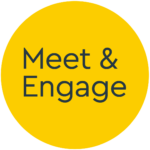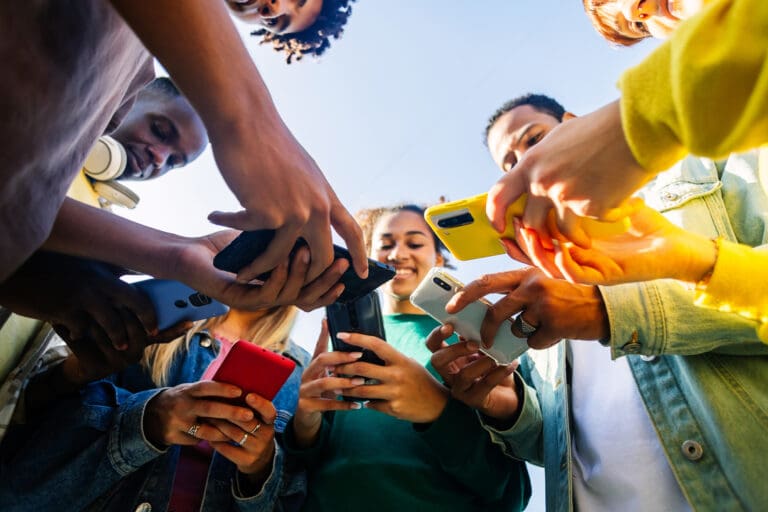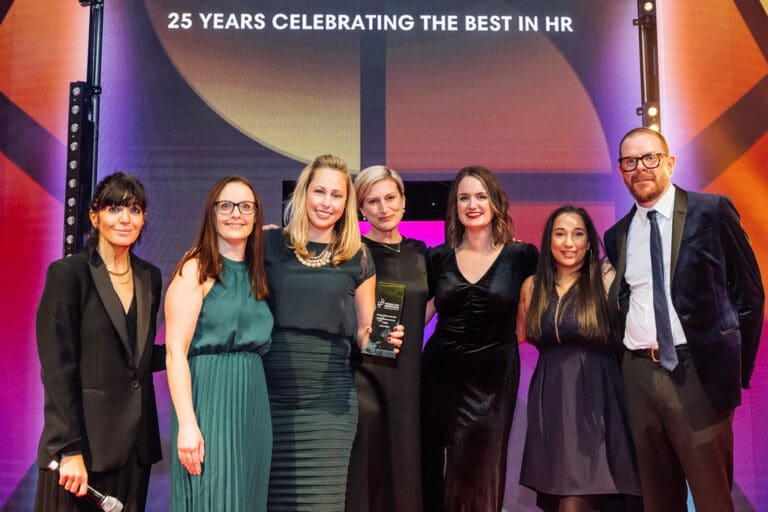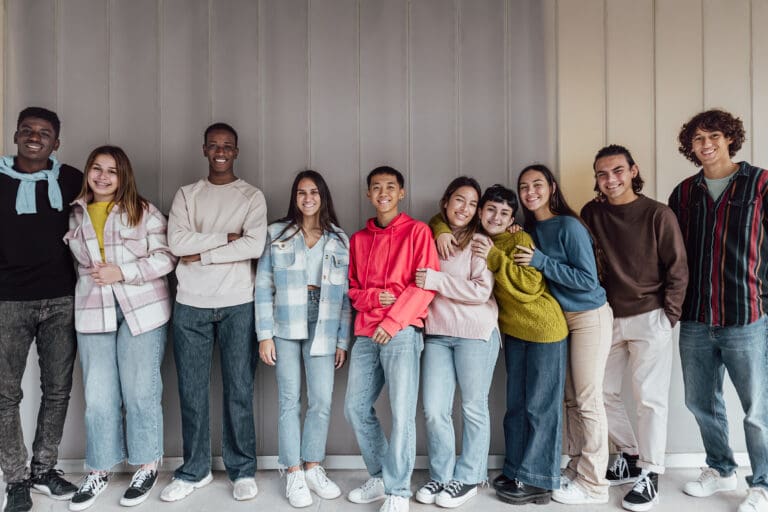Amazon’s Sadie Natchigal and Arup’s Mikey Bishop share the keys to hosting a successful virtual event
It is safe to say that 2020 has been a year full of unpredictable surprises. Many businesses, industries and governments have had to make huge pivots in processes and plans in order to stay ahead and when it comes to prospective candidates searching for employment opportunities, there has never been a more confusing time.
Right now, candidate experience, communication, and support are more important than ever before and as many resourcing teams see reduced workforce or obstacles that have slowed down usual performance (Wi-Fi troubles, anyone?), virtual engagement tools have been a silver bullet for employers to deliver a high quality experience and detailed communication to keep candidates informed at every step of their recruitment journey.
Users of Meet & Engage and our conversational recruiting technology know this better than most. We spent some time with Sadie Natchigal from the Employer Brand team at Amazon and Mikey Bishop from the Early Careers team at Arup to discuss some of the best practises around using virtual engagement technology and share some of their personal experiences around running virtual engagement events for their candidates. You can catch the full recording of the event here, but to make things simple, we’ve summarised some of the stand-out tips and hints into 7 simple steps.
So, without further ado, over to Sadie and Mikey!
1. Know your audience
When it comes to creating events and implementing virtual engagement strategies, it’s easy to fall into the trap of following those who have gone before.
In the words of marketing whiz Neil Patel, “It’s hard to beat your competition when you’re copying them.” There’s a truth here when it comes to hosting online events – it’s easier to jump on the bandwagon and host another cookie-cutter event, but without establishing who the event or activity is truly for, you run the risk of leaving candidates confused, questions unanswered and irrelevant conversation. Mikey explains:
“In our Early Careers team, we recruit for three cohorts mainly, which is graduates, placements and apprentices. And all of those populations are looking for different things as part of their candidate experience.”
Knowing your audience can also bring great benefits to your promotion.
Sadie explains that understanding your audience really helps you to “develop your promotion and marketing campaign for your event”. Prior to an event, Amazon send targeted, personalised emails and promote events on the social media platforms they know candidates engage with most.
Arup have taken it one step further. The Early Careers team found that apprentices weren’t as chatty or engaged so decided to host sessions for influencers like parents and teachers to build their knowledge of Arup’s apprenticeship opportunities intending information to filter down and educate prospective apprentices indirectly.
Knowing your audience means that you’ll understand those finer details like the best time and place to share, promote and engage so you can host events and virtual engagement opportunities at the right times to mitigate the chances of a no show!
2. For tech’s sake
You wouldn’t eat soup with a fork. When it comes to achieving something successfully using the right tool is just as important as how you use it. The same applies to online candidate engagement events. The purpose of your event and your candidates’ needs should remain central to everything you do and that includes choosing the right tool.
While group chats and events are a great way to inform cohorts of candidates about a particular theme or topic, we’ve seen less confident individuals engage less, find out less and gain less value. Using the versatile Meet & Engage live chat messaging platform, Arup combatted this by running 1-2-1 drop-in sessions alongside group chat events to give all candidates the reassurance that they have a medium to connect with the careers team and address their questions. For Mikey, it’s a combination that is key for “a really great candidate experience”.
Whatever tool you use, Sadie stressed the importance of direct contact. The current situation is confusing, especially for candidates joining firms at a distance so having the option to get in touch in a quick and seamless way, such as 1-2-1 online messaging, offers candidates additional avenues for support, information and engagement.
3. Give your audience plenty of notice
This may seem like an obvious one but it’s a common mistake. Inviting a senior member of the team to host an event with only two attendees or worse none at all, won’t help you get buy-in and it won’t create an engaging event. You may have fantastic content and a great panel of speakers but no audience means no event.
For Mikey, giving your audience enough notice serves two main purposes.
- Candidates can add something to the calendar, building their excitement and helping to ensure you don’t lose touch.
- It gives candidates the chance to think about what they want to ask.
Remember, virtual events work two ways! To make your events successful, you need your candidates on-side so it’s crucial they join your event excited and prepared. This helps maintain a high level of enthusiasm and engagement on the day and also helps more timid candidates, who will see other participants’ questions in a group chat environment, take away a great deal especially if there are questions asked by other candidates that they hadn’t thought of.
4. Get creative
Hosting a virtual event won’t make you stand out, but your speakers, theme and topic that all provide candidates with a lot of value will. Mikey shares:
“it’s really about outlining the benefits to candidates for joining your events, especially in the graduate market, people get a lot of invites to webinars, so you need to make sure that you’re explaining what it is that makes your event stand-out”
Amazon and Arup run events throughout the recruitment process to support candidates of varying levels of experience through every stage.
While attraction chats around the company culture help to bring new people into Amazon’s recruiting funnel, the hiring team also host chats at the interview stage so candidates can understand what to expect and get tips on how to succeed. “Candidates who’ve done these sessions perform better and onsite, because they actually are more prepared.” Says Sadie.
Inviting a current grad or senior figure from the business to host chats can also help you stand-out. After all, your people really are your best assets. Research from Bright Network graduates in particular want to hear from people they can really relate to – the employees who have worked in that role. Arup host chat events such as its ‘Graduate to Guru’ events that connects candidates with an existing employee who started as a graduate.
Mikey shares his thoughts on the value of these events; “Candidates can get some real insight into what that role actually looks like, which can then benefit their application.”
5. Stick to your agenda – No tangents please
There’s nothing worse than promoting a chat about one topic only to end up discussing another. Candidates will have questions and they will want them answered so creating an agenda and sticking to it will help you to manage expectations and stay on track.
But it’s not all on you. You can use the technology to your advantage; “Use the system to help you get back on track. So, you can use the poll feature. You can check content to bring it back to what it is that you’re actually talking about.” Says Mikey.
Before your event, you can add all the content you’d like to share and schedule polling questions you’d like to ask, so on the day, you only have to think about answering questions. On top of that, all of group chats are moderated giving you complete control over what’s shared. If a candidate goes off topic, no problem, respond to them in a private message and let them know if you have any upcoming events covering that topic.
6. Anticipate, anticipate, anticipate
Preparation is key to creating a successful virtual event, the more prepared you are, the smoother your event will be for you and your candidates. Unfortunately, lack of preparation is one of the most common pitfalls we see!
You can collate FAQs from your website and once you’ve run a few virtual events, you can start to build a library of common themes.
Because Amazon’s sessions are mostly live streamed, Sadie explained the importance of prompting speakers with questions and populating the chat with questions candidates are likely to ask to break the ice and keep sessions engaging.
“We have stock questions, or really popular questions, that we’ve prepared in case that there aren’t enough questions coming from the audience.”
Being prepared can also take any pressure off your speakers and moderators. Sadie’s top tip is to make things easy for your speakers by providing your moderators with right tools and prep documents. Your team have great things to say and knowledge to share, so let them shine!
7. If you don’t ask you don’t get – Listen to your candidates
It’s all too easy to invest all of your time and effort into creating and running the perfect event but what happens after is just as important. Mikey and Sadie both agree that gathering feedback and analysing data after your event is one of the most important stages in running virtual events, so don’t let it fall of your list!
Your candidates are investing time into creating an application and attending your events, so don’t be afraid to ask what they think. “It’s nice to give candidates the opportunity to have a bit of a voice.” Mikey explains.
Arup find the live polling feature especially helpful for learning more about candidates, how they prefer to engage and where they need more support. But don’t just listen to positives, act on the negatives! Mikey shares that it’s important to show you’re “listening to what your audience is actually saying and not just staying static while receiving negative feedback.”
Sadie expands on this; “What I found really helpful about the Meet & Engage tool is that there’s a lot of data that you’re able to pull on how successful your event is, and learnings on how to improve for next time. I also found that the team has been really helpful and able to work with us to improve and customize that data based on what’s important for us to measure.”
By asking the right questions, you can obtain rich data that can help to drive future chat themes and success, so you know you’re giving candidates exactly what they want.
So there you have it, 7 simple steps for creating a great virtual event from the experts themselves. Armed with these tips, you’ll be well on your way to keeping your candidates engaged at a time it matters most.
If you’d like to find out more about our suite of conversational recruiting technology feel free to get in touch with me at jodie.grove@meetandengage.com or book a demo






